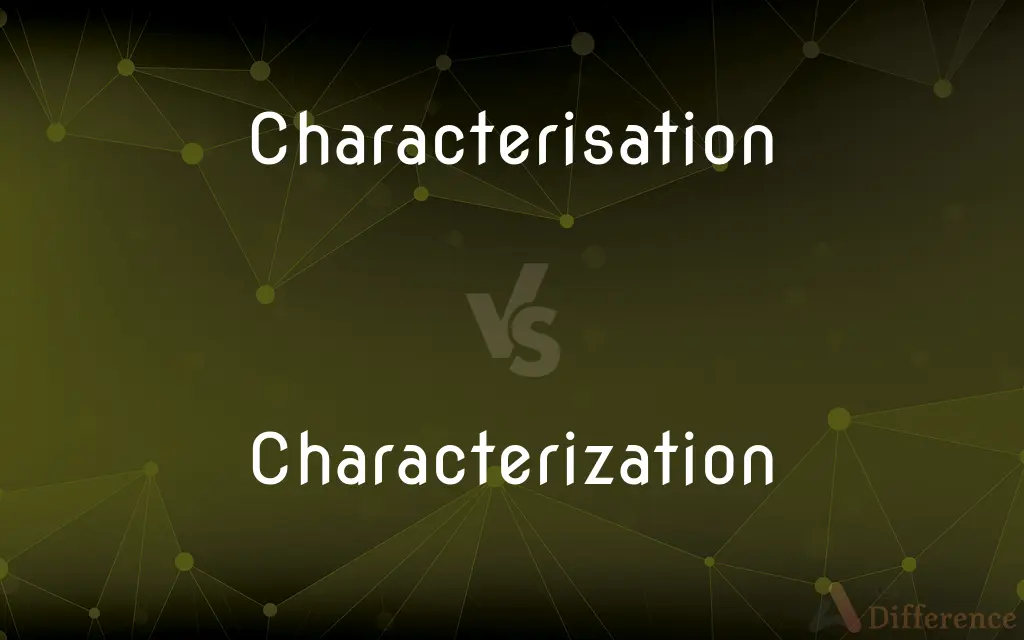Characterisation vs. Characterization — What's the Difference?
Edited by Tayyaba Rehman — By Urooj Arif — Updated on March 4, 2024
Characterisation and characterization refer to the same concept of depicting characters in narrative art, but they differ in spelling by region: "characterisation" is British English, while "characterization" is American English.

Difference Between Characterisation and Characterization
Table of Contents
ADVERTISEMENT
Key Differences
Characterisation is the process used in narrative arts like literature, film, and theater to create and develop characters, making them distinct and relatable to the audience. It involves aspects such as personality, appearance, actions, thoughts, and interactions with other characters. Characterization, on the other hand, refers to the exact same process and involves the same techniques and goals in narrative arts. The difference lies solely in the spelling, which aligns with American English conventions. This variant is preferred in the United States and influences how the concept is documented and discussed in American literature and academic contexts.
The choice between characterisation and characterization often depends on the intended audience or the regional language norms of the publication. Writers and educators might choose one spelling over the other based on these considerations, ensuring consistency with other language conventions in their work.
Despite the difference in spelling, the techniques and importance of characterisation and characterization in storytelling are universally acknowledged. Effective character development is crucial for engaging the audience, providing depth to the narrative, and driving the plot forward.
Both terms emphasize the critical role of character development in storytelling, underscoring how characters' complexities and growth contribute to the narrative's impact. Whether in a novel, a film, or a stage play, the process involves detailed planning and creative execution to make fictional characters seem real and memorable to the audience.
Comparison Chart
Spelling
British English
American English
ADVERTISEMENT
Usage
Preferred in the UK and Commonwealth countries.
Preferred in the United States.
Definition
Process of developing characters in narrative arts.
Same as characterisation, different spelling.
Importance
Crucial for engaging and relating to the audience.
Identical in role and significance.
Techniques
Involves detailing personality, actions, and growth.
Same techniques and goals in character development.
Compare with Definitions
Characterisation
Physical Description.
Detailed characterisation includes describing a character's appearance.
Characterization
Personality Development.
Characterization allows writers to craft complex heroes and villains.
Characterisation
Social Interactions.
Characterisation often involves depicting relationships between characters.
Characterization
Physical Description.
Characterization helps visualize characters through detailed descriptions.
Characterisation
Personality Development.
Through characterisation, a novelist can make protagonists relatable.
Characterization
Social Interactions.
Characterization includes how characters influence and interact with each other.
Characterisation
Evolution Over Time.
Characterisation shows how characters grow or change throughout a story.
Characterization
Emotional Depth.
Through characterization, authors delve into characters' motivations.
Characterisation
Emotional Depth.
Effective characterisation explores a character's inner conflicts.
Characterization
Evolution Over Time.
Characterization tracks the development of a character's journey.
Characterisation
(British spelling) characterization
Characterization
Characterization or characterisation is the representation of persons (or other beings or creatures) in narrative and dramatic works. The term character development is sometimes used as a synonym.
Characterisation
A graphic or vivid verbal description;
Too often the narrative was interrupted by long word pictures
The author gives a depressing picture of life in Poland
The pamphlet contained brief characterizations of famous Vermonters
Characterization
The act or an instance of characterizing.
Characterisation
The act of describing distinctive characteristics or essential features;
The media's characterization of Al Gore as a nerd
Characterization
A description of qualities or peculiarities
A list of places of interest, with brief characterizations of each.
Characterization
The act or process of characterizing.
Common Curiosities
Is there any difference in meaning between characterisation and characterization?
No, the meaning and application of the terms are identical; the difference is purely in spelling.
Why do characterisation and characterization have different spellings?
The difference in spelling reflects regional language conventions: "characterisation" for British English and "characterization" for American English.
What is characterisation/characterization?
Both terms refer to the technique of creating and developing characters in narrative arts, making them distinct and engaging for the audience.
How important is characterisation/characterization in storytelling?
Character development is critical for engaging the audience, adding depth to the narrative, and driving the story forward.
Do authors and screenwriters follow the same principles of characterisation/characterization?
Yes, the principles of character development apply across different narrative forms, though techniques may vary by medium.
Does the choice between characterisation and characterization affect the quality of storytelling?
No, the quality of storytelling is determined by the effectiveness of the character development process, not the spelling of the term.
How do cultural differences influence characterisation/characterization?
Cultural contexts can influence how characters are developed and perceived, adding layers of complexity to characterisation/characterization.
Can the terms characterisation and characterization be used interchangeably?
Yes, they can be used interchangeably, but the choice of spelling should consider the intended audience's language norms.
How does characterisation/characterization contribute to a narrative?
It provides depth to characters, making them relatable, driving the plot, and enhancing the overall impact of the story.
Are there specific techniques used in characterisation/characterization?
Yes, techniques include detailing characters' personalities, appearances, thoughts, actions, and interactions with others.
Share Your Discovery

Previous Comparison
Across vs. Cross
Next Comparison
Comprise vs. CompromiseAuthor Spotlight
Written by
Urooj ArifUrooj is a skilled content writer at Ask Difference, known for her exceptional ability to simplify complex topics into engaging and informative content. With a passion for research and a flair for clear, concise writing, she consistently delivers articles that resonate with our diverse audience.
Edited by
Tayyaba RehmanTayyaba Rehman is a distinguished writer, currently serving as a primary contributor to askdifference.com. As a researcher in semantics and etymology, Tayyaba's passion for the complexity of languages and their distinctions has found a perfect home on the platform. Tayyaba delves into the intricacies of language, distinguishing between commonly confused words and phrases, thereby providing clarity for readers worldwide.














































